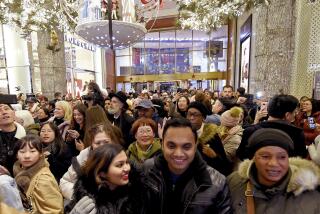Economic Growth Can’t Continue but There Is No End to Development : Ecology: The global economy has outgrown its supply limits because environmental feedback, like global warming, is delayed.
- Share via
HANOVER, N.H. — In the ‘80s, the economy grew beyond what anyone needed or wanted and beyond what could be sustained. Debt--government, corporate, consumer debt--was its main engine. Everyone knew the growth couldn’t last.
What’s needed is not more of this dumb growth but smart development.
Smart development builds on a region’s own skills, resources and local businesses. Dumb growth invites a big corporation in, surrenders control and profits to a distant headquarters, undercuts local manufacturers and risks layoffs without warning.
Recession-resistant development produces things people need. Unsustainable growth churns out tinsel products that consumers have to be seduced into buying--until times get tough, when they quickly give them up.
Long-term development means using investment money and construction skills to maintain existing roads, bridges and buildings before building new ones. It means educating people and protecting their health. Flimflam growth disregards such investments, because they don’t pay off soon enough.
Sustainable development ensures that forests and fields continue to produce wood, paper and food, to recharge wells, to control floods, to harbor wildlife, to attract tourists and to please residents. Fly-by-night growth clear-cuts forests to keep loggers and sawmills going just a few more years until the trees run out. It waives environmental regulations, as long as the cleanup costs can be transferred to the public or into the future. It covers the landscape the tourists come to see with the same kind of ugliness they leave home to escape.
Smart development invests in insulation, efficient cars and ever-renewed sources of energy. Dumb growth crashes around looking for more oil.
To draw such distinctions between sustainable development and unsustainable growth isn’t to be soft-headed or anti-economic. It’s to be practical and sane, to look for an economy that doesn’t delude itself with booms that create their own busts, or with drawing down and polluting the resources of the Earth, upon which all economic activity depends.
“When something grows,” says World Bank economist Herman Daly, “it gets quantitatively bigger; when it develops, it gets qualitatively better. Quantitative growth and qualitative development follow different laws. Our planet develops over time without growing. Our economy, a subsystem of the finite and non-growing Earth, must eventually adapt to a similar pattern of development.”
Both the United States and the world economy have already reached--and surpassed--their sustainable physical limits. Ground water is being drawn down, soils eroded, forests cut faster than they grow, fish caught faster than they reproduce, non-renewable fossil fuels burnt without developing substitutes. Pockets of the planet are overfilled with waste. The entire economy has overshot the rate at which the Earth can sustainably provide resources and process pollution.
The economic overshoot that caused the current recession and the environmental overshoot that is evident in diminishing resources and escalating pollution are dissimilar in many ways--above all, in the different time-scales with which they will work themselves out. But underlying any overshoot are three common factors: rapid growth, a limit beyond which the growth cannot be sustained and an information problem.
Because of inattention, faulty data, delayed feedback, slow response mechanisms or plain denial, the growth is not reigned in as it shoots by the limit. It goes too far, until the bills come due and a serious retrenchment becomes necessary.
Debt, denial and delayed market feedback allowed the national economy to grow past its short-term demand limits. By the time it was clear that all the condos couldn’t be sold, there were thousands more still in the construction pipeline. The global economy has grown past its long-term supply limits because environmental feedback--such as global warming, which takes decades to gather momentum--is often delayed and because, for a while, we can draw down stocks of ground water, forests, soils, fuels that built up over centuries or in some case millennia. We can stay beyond the limits until the resources run down and the pollutants become intolerable. In most parts of the world, given the rates of degradation, that will take another decade or two at the most.
We have two choices, and neither of them is to grow. We can let the limits themselves stop us, in their own time and with complete indifference to our values. Or we can purposely slow down, ease back, become less wasteful and more efficient, contain the damage and preserve what is most important to us. We will discover, if we choose the latter, that after our rather simple physical needs are met, what is important is mostly qualitative, not quantitative. We can’t grow, but we can go on developing indefinitely.
More to Read
Inside the business of entertainment
The Wide Shot brings you news, analysis and insights on everything from streaming wars to production — and what it all means for the future.
You may occasionally receive promotional content from the Los Angeles Times.










